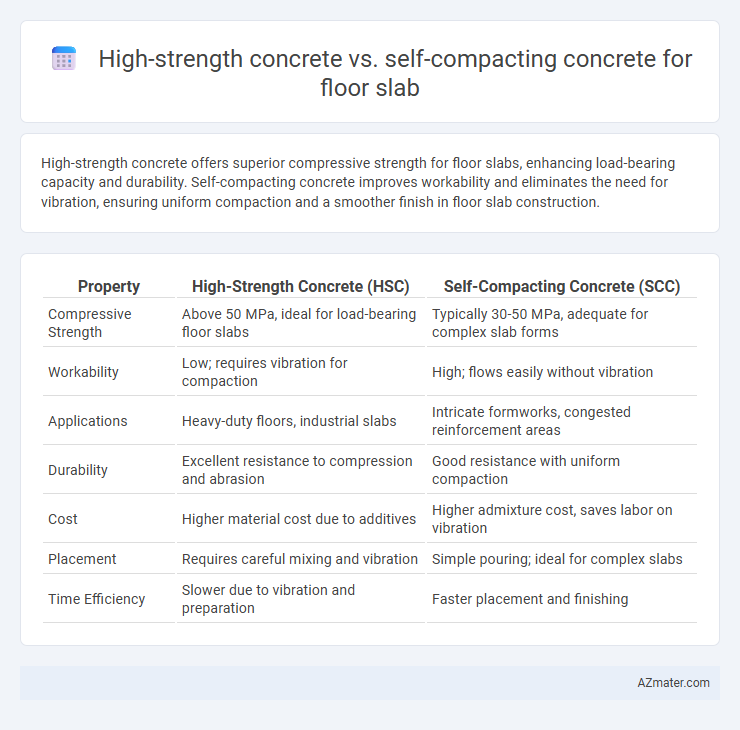High-strength concrete offers superior compressive strength for floor slabs, enhancing load-bearing capacity and durability. Self-compacting concrete improves workability and eliminates the need for vibration, ensuring uniform compaction and a smoother finish in floor slab construction.
Table of Comparison
| Property | High-Strength Concrete (HSC) | Self-Compacting Concrete (SCC) |
|---|---|---|
| Compressive Strength | Above 50 MPa, ideal for load-bearing floor slabs | Typically 30-50 MPa, adequate for complex slab forms |
| Workability | Low; requires vibration for compaction | High; flows easily without vibration |
| Applications | Heavy-duty floors, industrial slabs | Intricate formworks, congested reinforcement areas |
| Durability | Excellent resistance to compression and abrasion | Good resistance with uniform compaction |
| Cost | Higher material cost due to additives | Higher admixture cost, saves labor on vibration |
| Placement | Requires careful mixing and vibration | Simple pouring; ideal for complex slabs |
| Time Efficiency | Slower due to vibration and preparation | Faster placement and finishing |
Introduction to Modern Concrete Technologies
High-strength concrete (HSC) offers superior compressive strength and durability, making it ideal for floor slabs requiring enhanced load-bearing capacity and resistance to environmental stress. Self-compacting concrete (SCC) provides exceptional flowability and vibration-free placement, ensuring a smooth, uniform finish and reduced labor costs in complex slab geometries. Modern concrete technologies integrate advanced admixtures and mix designs to optimize performance, durability, and constructability tailored to specific structural demands.
Overview of High-Strength Concrete
High-strength concrete (HSC) is characterized by its compressive strength exceeding 6,000 psi, making it ideal for floor slabs requiring enhanced load-bearing capacity and durability. It typically incorporates low water-to-cement ratios, high-quality aggregates, and supplementary cementitious materials such as silica fume or fly ash to achieve superior strength and reduced permeability. HSC ensures improved resistance to cracking and longer service life, making it a preferred choice in industrial and commercial slab applications where structural integrity is critical.
Understanding Self-Compacting Concrete
Self-compacting concrete (SCC) eliminates the need for mechanical vibration, ensuring uniform compaction and reducing labor costs while maintaining high strength and durability for floor slabs. SCC's highly fluid nature allows it to flow easily into complex formworks and around dense reinforcement, minimizing air voids and enhancing structural integrity. Compared to traditional high-strength concrete, SCC offers superior workability and surface finish without compromising mechanical properties critical for floor slab performance.
Key Differences in Composition
High-strength concrete typically features a low water-cement ratio, high cement content, and the use of silica fume or fly ash to achieve compressive strengths exceeding 50 MPa, making it ideal for structural floor slabs requiring durability and load-bearing capacity. Self-compacting concrete incorporates high-range water reducers, viscosity-modifying agents, and a balanced mix of fine materials such as limestone powder to ensure flowability and segregation resistance without mechanical vibration. The key difference in composition lies in self-compacting concrete's optimized particle packing and rheological properties to enhance workability, whereas high-strength concrete focuses on dense matrix and strength-enhancing additives.
Structural Benefits: High-Strength vs Self-Compacting Concrete
High-strength concrete offers superior load-bearing capacity and enhanced durability for floor slabs, making it ideal for structures subjected to heavy loads or aggressive environments. Self-compacting concrete provides excellent workability and uniform compaction without mechanical vibration, reducing voids and improving surface finish, which enhances structural integrity and reduces maintenance costs. Both materials contribute to extended structural lifespan, but high-strength concrete excels in compressive strength while self-compacting concrete optimizes constructability and overall quality.
Workability and Placement Efficiency
High-strength concrete offers superior compressive strength but requires skilled placement and vibration to ensure proper compaction, often reducing workability during floor slab construction. Self-compacting concrete excels in workability due to its high flowability, eliminating the need for vibration and enabling faster, more efficient placement in complex formworks. For floor slabs, self-compacting concrete significantly improves placement efficiency and surface finish, while high-strength concrete provides enhanced structural performance under high load conditions.
Floor Slab Performance: Durability and Load Capacity
High-strength concrete offers exceptional load capacity for floor slabs, supporting heavy structural demands while enhancing durability through reduced permeability and increased resistance to cracking. Self-compacting concrete provides superior workability, ensuring uniform compaction around reinforcement and complex formwork, which minimizes voids and enhances long-term durability. Both concrete types improve floor slab performance, but high-strength concrete excels in load-bearing capacity, whereas self-compacting concrete ensures optimal microstructure for sustained durability.
Cost Considerations and Economic Impact
High-strength concrete (HSC) generally involves higher material costs due to the use of specialized cement types and admixtures, but it offers prolonged durability and reduced maintenance expenses for floor slabs. Self-compacting concrete (SCC) reduces labor costs by eliminating the need for vibration and allows faster placement, which can shorten construction schedules and lower overall project expenses. When evaluating economic impact, SCC's efficiency in placement and finish quality often leads to reduced lifecycle costs, while HSC's superior mechanical properties extend structural longevity, influencing long-term investment returns.
Sustainability and Environmental Aspects
High-strength concrete for floor slabs reduces material quantity due to its superior load-bearing capacity, lowering resource consumption and associated environmental impact. Self-compacting concrete minimizes construction noise and eliminates vibration energy, enhancing worker safety and reducing environmental disturbances. Both types offer sustainability benefits, but self-compacting concrete's ability to incorporate recycled materials and reduce waste supports more eco-friendly construction practices.
Choosing the Right Concrete for Floor Slabs
High-strength concrete offers superior load-bearing capacity and durability for floor slabs subject to heavy stresses and dynamic loads, making it ideal for industrial and commercial applications. Self-compacting concrete facilitates faster construction with enhanced surface finish and reduced labor costs, as its ability to flow and consolidate without vibration ensures uniformity in complex formworks. Selecting between high-strength and self-compacting concrete depends on project-specific factors such as structural requirements, construction speed, and site conditions.

Infographic: High-strength concrete vs Self-compacting concrete for Floor slab
 azmater.com
azmater.com